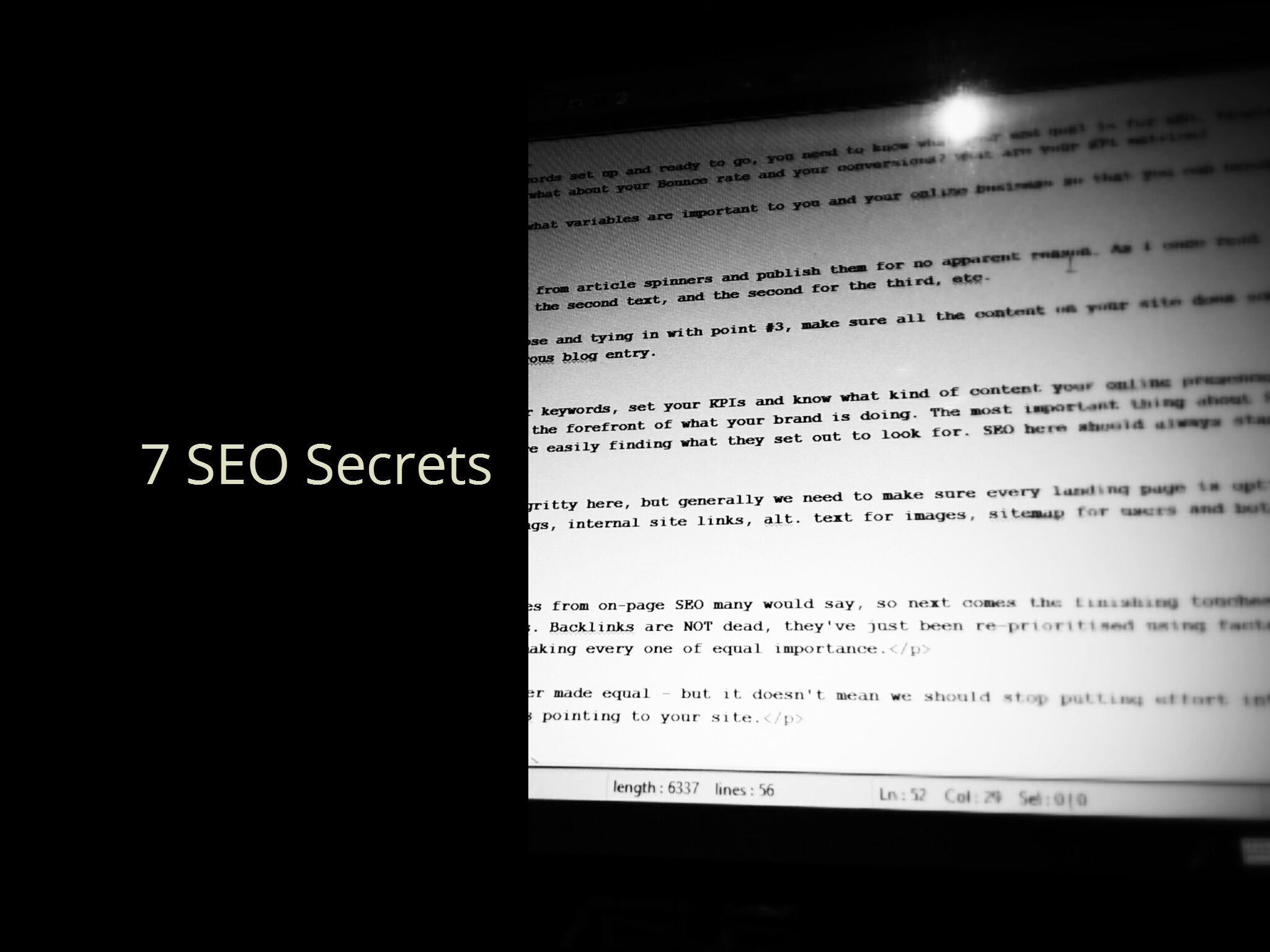October 27 2016
7 SEO Secrets No One Else Will Tell You.. Except Us
New brands and startups establishing their online presence will keep saying they want content, backlinks, and whatever just to rank number #1 on Google, and many SEO companies will claim they can do this for you at an exorbitant price - but at the end of the day, these are things you can actually do by yourself, and at a lower cost.
All you really need to know are these 7 things:
1. Keyword Research
Keyword research is crucial to being "found" online. What are people typing into search engines to find you or your brand? What do you think people are typing? Are you targeting the correct keywords? Are they long or short tailed? What will work for my brand best?
Depending on your keyword(s) and how niche your industry is, ranking #1 could be super easy, or plain impossible. But first, you need to know which ones to target and whether they are too competitive.
2. Establishing KPIs
Once you've got your keywords set up and ready to go, you need to know what your end goal is for SEO. People may be able to find you, and your traffic is heightened 10 folds - but what about your Bounce rate and your conversions? What are your KPI metrics?
You need to know exactly what variables are important to you and your online business so that you can benchmark your performance and consistently improve from it.
3. Quality Content
Don't just churn out stuff from article spinners and publish them for no apparent reason. As I once read from Copyblogger - the purpose of the first text is to persuade them to read the second text, and the second for the third, etc.
Each article serves a purpose and tying in with point #3, make sure all the content on your site does something for your readers - be it a useful "how-to" article or just a humourous blog entry.
4. On-Page SEO
Once you've figured out your keywords, set your KPIs and know what kind of content your online presence will offer - then only should we start moving to actual SEO. Your website acts as the forefront of what your brand is doing. The most important thing about SEO is not doing things to get your site to the top, but to make sure your users are easily finding what they set out to look for. SEO here should always stand for "Search EXPERIENCE Optimisation".
We won't get into the nitty gritty here, but generally we need to make sure every landing page is optimised for both search engine and user, namely meta title and description, H1-H6 tags, internal site links, alt. text for images, sitemap for users and bots, Open Graph tags and keyword density - all the basic stuff.
5. Backlinks
Most of the heavy lifting comes from on-page SEO many would say, so next comes the finishing touches of what used to be the bulk of SEO, and what everyone's been waiting for - backlinks. Backlinks are NOT dead, they've just been re-prioritised using factors such as domain authority to rank the importance of backlinks as opposed to making every one of equal importance.
Yes, all backlinks are no longer made equal - but it doesn't mean we should stop putting effort into having them. If anything, more effort should be needed to get the best kind of backlinks pointing to your site.
6. Complete User Experience
Of course we aren't close to being done yet. Sure, you might have done your keyword research, established KPI benchmarks, devised a content strategy, maximised on-Page SEO and off-page backlinking efforts - you might now have the best traffic ranking on Alexa, but people are bouncing like crazy, conversions are worst than ever and customer service is working 24/7 for the most redundant questions.
What's going on? Your brand is getting found, and the users should be landing on the correct site to get what they want - what's the problem now?
They're on your site, but they haven't found what they were looking for. This is where site design and architecture come into play. Consider these simple questions:
- Is there a proper-functioning search box on your site?
- Is it easy to navigate with the menu, or is it too cluttered and confusing?
- Can I reach someone easily when I'm having trouble with the site and wish to purchase something?
UX takes the entire website to a whole final level - a combination of carefully planned content that's easily found on SERPs, and takes the user into another realm of surreality through design. If customers don't know how to use your site upon landing, that's when they bounce.
7. Tracking and Recalibrating
Lastly and most importantly - what most of these SEO companies aren't going to tell you is that SEO is a long term thing. You don't just get ranked on the first page and assume it's going to stay that way forever. There will always be competition and people who will try to take away your share of the pie.
Constantly monitor your progress and performance with the help of your KPIs, and keep a close watch on existing and new competitors to see how they might be doing better than you. Learn from what they might be doing wrong and avoid making their mistakes. Your entire digital strategy is never fixed and can always be improved upon, so never be complacent even when you've landed yourself at the top of SERPs.
What Should You Do?
Offer a product or service that's truly unique and beneficial to people. That's the greatest SEO anyone can ever do for their business - online or offline.
About us

We’re an e-commerce consultancy agency specialising in User Experience Mapping and Conversion Funneling.
